Unit 1 Past and Present Welcome to the unit课件(共32张PPT) 2023-2024学年牛津译林版英语八年级下册
文档属性
| 名称 | Unit 1 Past and Present Welcome to the unit课件(共32张PPT) 2023-2024学年牛津译林版英语八年级下册 |
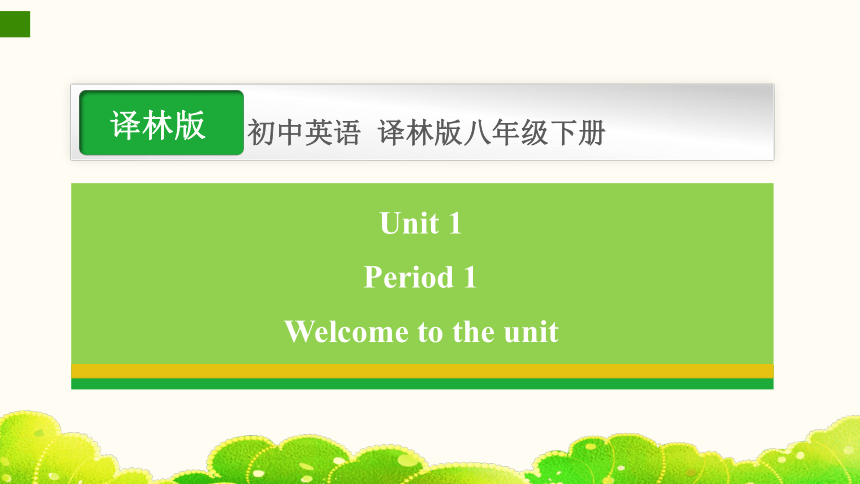
|
|
| 格式 | pptx | ||
| 文件大小 | 12.1MB | ||
| 资源类型 | 教案 | ||
| 版本资源 | 牛津译林版 | ||
| 科目 | 英语 | ||
| 更新时间 | 2024-01-03 11:30:38 | ||
图片预览

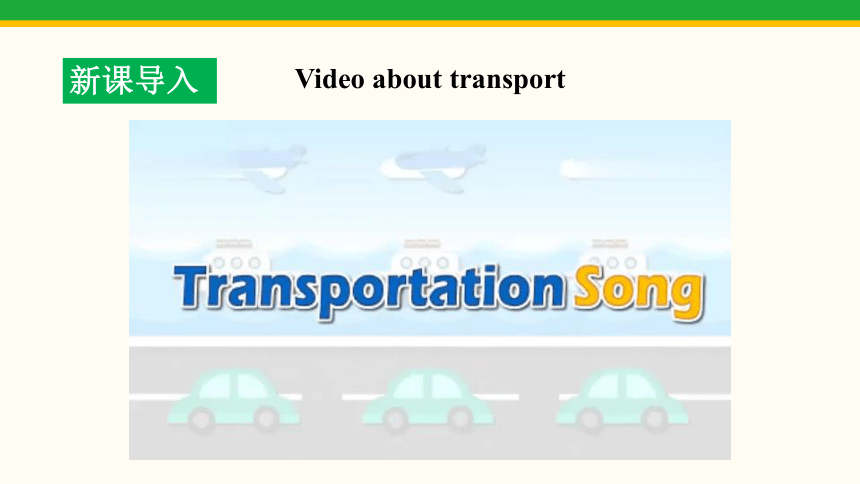
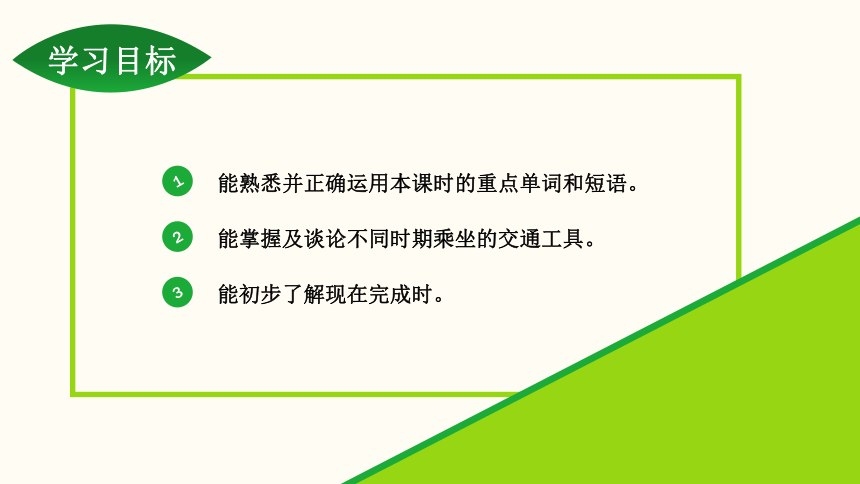
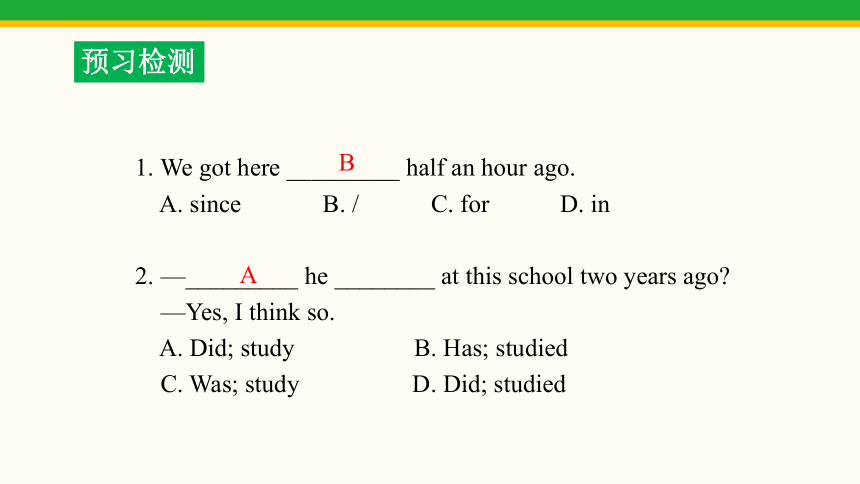
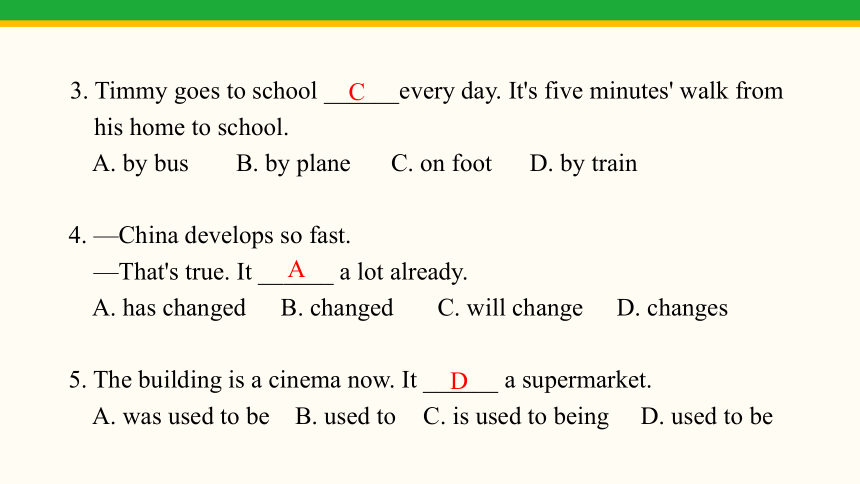
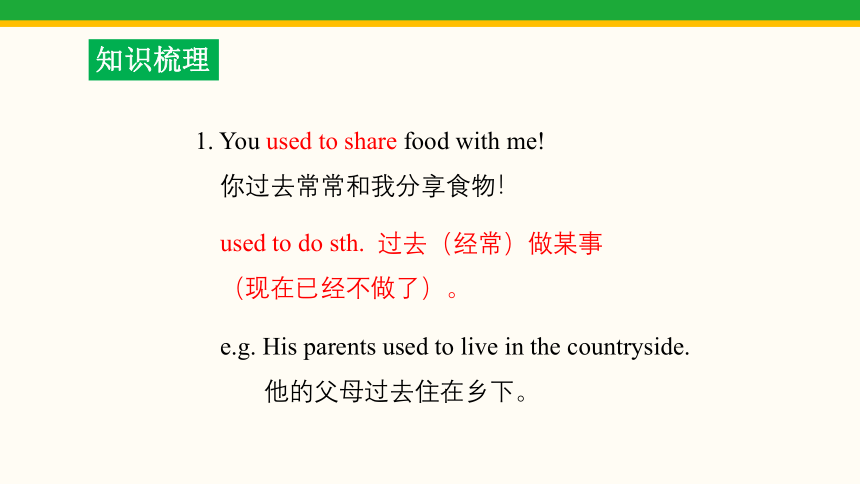
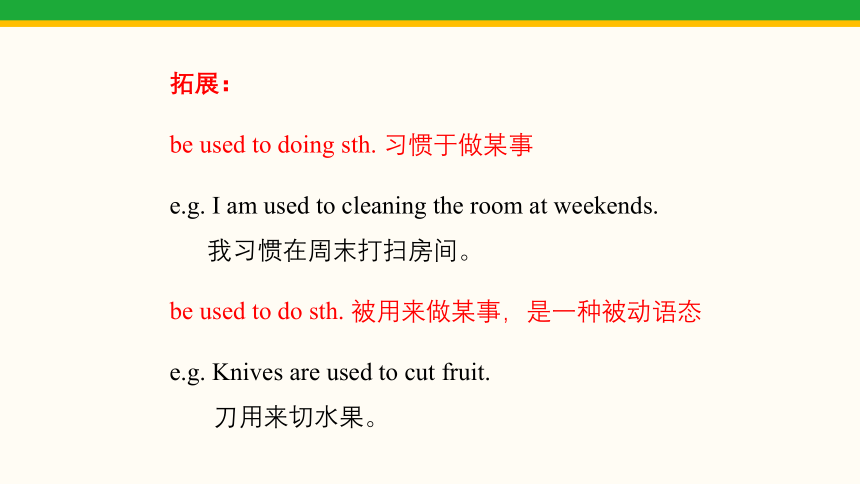
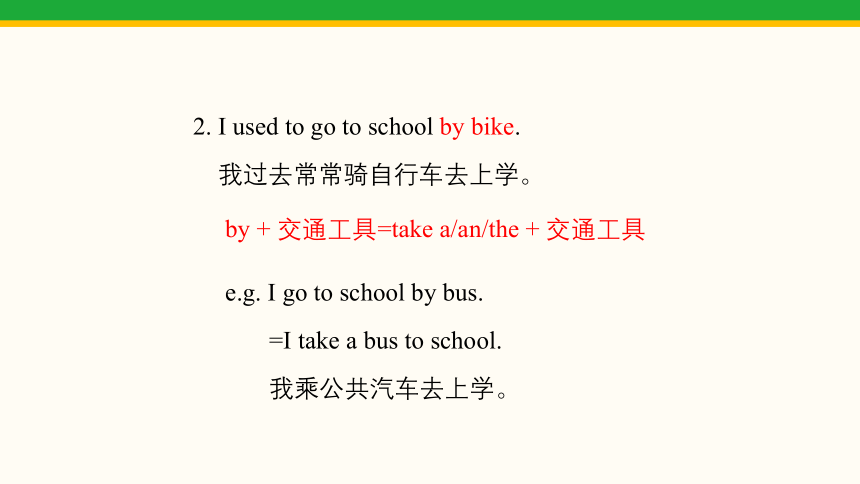
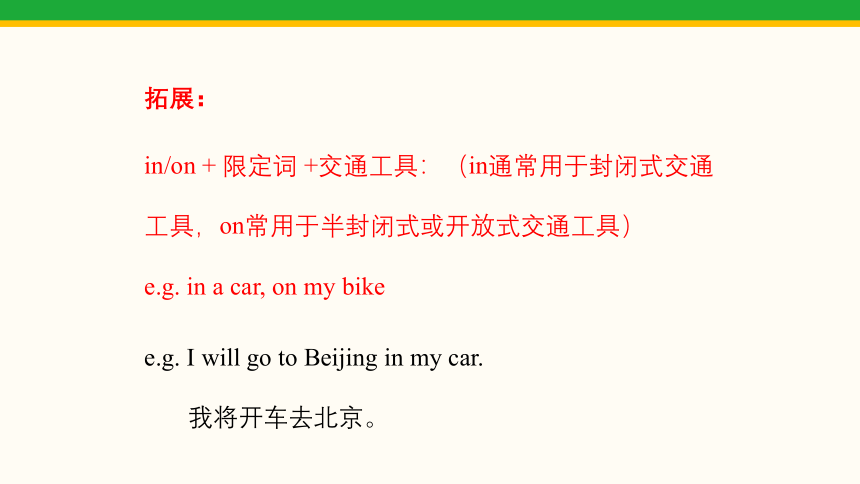
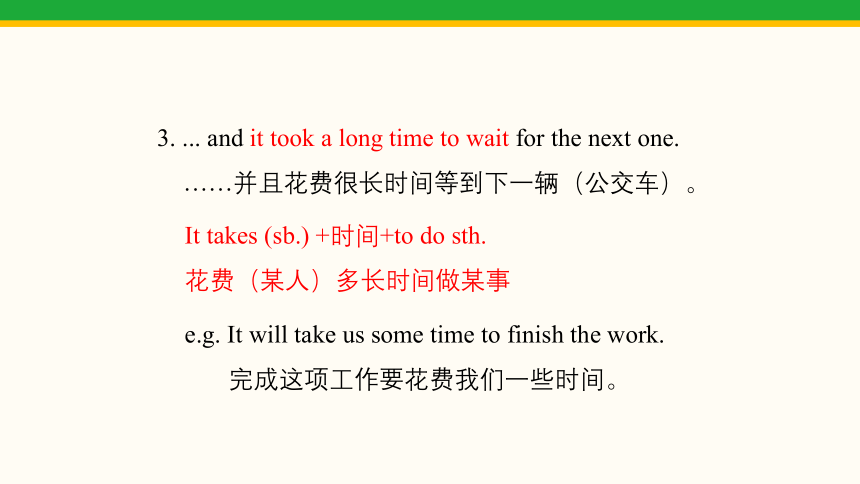
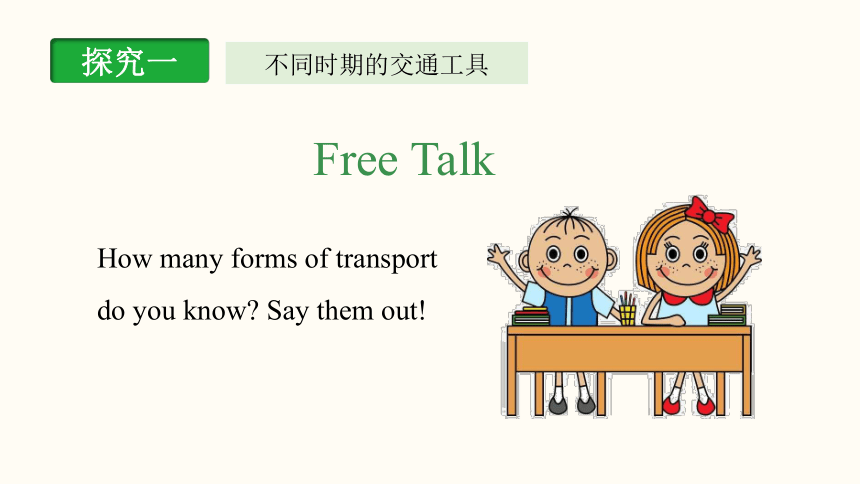
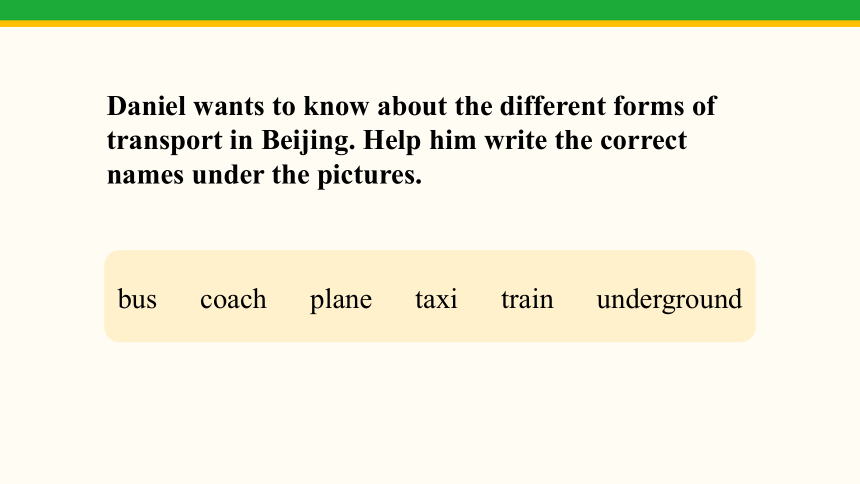
文档简介
(共32张PPT)
译林版
初中英语 译林版八年级下册
Unit 1
Period 1
Welcome to the unit
新课导入
Video about transport
1
2
能熟悉并正确运用本课时的重点单词和短语。
能掌握及谈论不同时期乘坐的交通工具。
3
能初步了解现在完成时。
预习检测
1. We got here _________ half an hour ago.
A. since B. / C. for D. in
2. —_________ he ________ at this school two years ago
—Yes, I think so.
A. Did; study B. Has; studied
C. Was; study D. Did; studied
B
A
3. Timmy goes to school ______every day. It's five minutes' walk from his home to school.
A. by bus B. by plane C. on foot D. by train
4. —China develops so fast.
—That's true. It ______ a lot already.
A. has changed B. changed C. will change D. changes
5. The building is a cinema now. It ______ a supermarket.
A. was used to be B. used to C. is used to being D. used to be
C
A
D
知识梳理
1. You used to share food with me!
你过去常常和我分享食物!
e.g. His parents used to live in the countryside.
他的父母过去住在乡下。
used to do sth. 过去(经常)做某事(现在已经不做了)。
拓展:
be used to doing sth. 习惯于做某事
be used to do sth. 被用来做某事,是一种被动语态
e.g. I am used to cleaning the room at weekends.
我习惯在周末打扫房间。
e.g. Knives are used to cut fruit.
刀用来切水果。
2. I used to go to school by bike.
我过去常常骑自行车去上学。
by + 交通工具=take a/an/the + 交通工具
e.g. I go to school by bus.
=I take a bus to school.
我乘公共汽车去上学。
拓展:
in/on + 限定词 +交通工具:(in通常用于封闭式交通工具,on常用于半封闭式或开放式交通工具)
e.g. in a car, on my bike
e.g. I will go to Beijing in my car.
我将开车去北京。
e.g. It will take us some time to finish the work.
完成这项工作要花费我们一些时间。
3. ... and it took a long time to wait for the next one.
……并且花费很长时间等到下一辆(公交车)。
It takes (sb.) +时间+to do sth.
花费(某人)多长时间做某事
不同时期的交通工具
Free Talk
How many forms of transport do you know Say them out!
Daniel wants to know about the different forms of transport in Beijing. Help him write the correct names under the pictures.
bus coach plane taxi train underground
coach
bus
taxi
underground
train
plane
Free Talk
1. How did you go to school when you were a primary student Why
2. How do you go to school now Why
Millie and her dad are talking about transport at different times. Listen to the tape and answer the questions.
1. How did Millie's dad go to school when he was a student
2. Why didn't he take a bus
3. How does Millie go to school Why
He used to go to school by bike.
She goes to school by bus. Because it's easy and fast.
Because there were always too many people on the bus, and
it took a long time to wait for the next one.
Millie: How did you go to school when you were a student, Dad
Dad: I used to go to school by bike.
Millie: Why didn't you take a bus
Dad: Well, there were always too many people on the bus, and
it took a long time to wait for the next one.
Millie: Really I go to school by bus. Now it's easy and fast.
Work in pairs and act it out!
Work in pairs and take turns to talk about it. Use the conversation below as a model.
past present
go to school on foot, by bike/bus by bike/bus/underground
go around the city by bus by bus/taxi/car
go to other cities by coach by coach/train/plane
A:How did you ______when you ______
B: I used to ______ by ______.
A:Why didn't you take ______
B: Well, there were ______, and it took a long time to ______.
A:Really I ______ by ______. Now it's ______.
通过以
活动小结
通过以上活动,我们可以知道:
不同的交通工具有:出租车_______,飞机_______,火车________,地铁____________等;
Amy的爸爸过去骑自行车__________去上学,Amy现在乘公交__________去上学。
taxi
plane
train
underground
by bus
by bike
探究二
初步了解现在完成时
The world is always changing. All of us are always changing. What about Eddie and Hobo
Listen to the tape and answer the questions below.
1. What does Hobo think of Eddie
2. What does Eddie think of Hobo
Hobo thinks that Eddie has changed and Eddie used to share food with him.
Eddie thinks that Hobo has changed too and Hobo used to be so kind to him.
Oh, where's my food It was in the bowl an hour ago.
Eddie, have you seen my food
Yes. I've just eaten it.
What You've eaten my food Why
You've changed, Eddie. You used to share food with me!
Because I was very hungry.
You've changed too. You used to be so kind to me.
Look and say
1. Eddie, have you seen my food
2. I've just eaten it.
3. You've eaten my food
4. You've changed, Eddie.
5. You've changed too.
Eddie, have you seen my food Eddie,你看到我的食物了吗?
此句用的是现在完成时的一般疑问句。现在完成时由“have/has + 动词过去分词形式”构成。现在完成时态主要在以下两种情形下使用:(1) 表示过去开始并持续到现在的动作或状态;(2) 表示过去已完成对现在有一定影响的动作。
肯定形式为:
主语+have / has+过去分词+其他.
e.g. I've just eaten it.
我刚吃了它。
否定形式为:
主语+haven't / hasn't+过去分词+其他.
e.g. I haven't seen you for a long time.
我很久没有见到你了。
疑问形式:
Have / Has+主语+过去分词+其他
肯、否定回答:
Yes, 代词+have / has.
No, 代词+haven't / hasn't.
e.g. — Have you finished your homework
你完成家庭作业了吗?
—Yes, I have. 是的,我完成了。
— No, I haven't. 不,我没有完成。
Work in pairs and act it out!
通过以
活动小结
通过以上活动,我们可以知道:
现在完成时由_______________________________构成;
肯定形式为:___________________________________;
一般疑问句形式为_______________________________。
have/has + 动词过去分词形式
主语+have / has+过去分词+其他.
Have / Has+主语+过去分词+其他
当堂检测
一、用所给单词的适当形式填空。
1. —Is your father at home now
—No. He __________ (take) a bus to work half an hour ago.
2. —Jim, you are watching TV again! Why not do your homework
—But I ____________(finish) my homework.
3. —I went to the cinema last night, but I didn't see you there.
—Because I __________ (have) no ticket.
4. —Hong Kong was a fishing village over one hundred years ago.
—Oh, really It ____________ (change) so much.
5. I used to __________ (live) in London.
took
have finished
had
has changed
live
二、翻译下列句子。
1. 这个地区的空气曾经很清新。
The air in this area ________ ________ ________ very fresh.
2. 我对香港的过去和现在感兴趣。
I am interested in Hong Kong's ________ ________ ________.
3. 我刚刚吃了足够多的食物。
I _______ _______ __________ enough food.
4. 我想和你一起分享这个大蛋糕。
I want to ________ this big cake ________ you.
5. 我想了解不同时代的运输工具。
I want to learn about transport ________ ________ ________.
used to be
past and present
have just eaten / had
share with
at different times
Unit 1
Period 1
不同交通工具名称:
长途汽车_________ 地铁_____________
飞机 _________ 火车_____________
初步了解现在完成时:
现在完成时的一般疑问句形式为:
___________________________________
现在完成时的肯定句形式为:
___________________________________
重点单词和短语:
past, present, just, used to
coach
underground
plane
train
主语+have / has+过去分词+其他.
Have / Has+主语+过去分词+其他
译林版
初中英语 译林版八年级下册
Unit 1
Period 1
Welcome to the unit
新课导入
Video about transport
1
2
能熟悉并正确运用本课时的重点单词和短语。
能掌握及谈论不同时期乘坐的交通工具。
3
能初步了解现在完成时。
预习检测
1. We got here _________ half an hour ago.
A. since B. / C. for D. in
2. —_________ he ________ at this school two years ago
—Yes, I think so.
A. Did; study B. Has; studied
C. Was; study D. Did; studied
B
A
3. Timmy goes to school ______every day. It's five minutes' walk from his home to school.
A. by bus B. by plane C. on foot D. by train
4. —China develops so fast.
—That's true. It ______ a lot already.
A. has changed B. changed C. will change D. changes
5. The building is a cinema now. It ______ a supermarket.
A. was used to be B. used to C. is used to being D. used to be
C
A
D
知识梳理
1. You used to share food with me!
你过去常常和我分享食物!
e.g. His parents used to live in the countryside.
他的父母过去住在乡下。
used to do sth. 过去(经常)做某事(现在已经不做了)。
拓展:
be used to doing sth. 习惯于做某事
be used to do sth. 被用来做某事,是一种被动语态
e.g. I am used to cleaning the room at weekends.
我习惯在周末打扫房间。
e.g. Knives are used to cut fruit.
刀用来切水果。
2. I used to go to school by bike.
我过去常常骑自行车去上学。
by + 交通工具=take a/an/the + 交通工具
e.g. I go to school by bus.
=I take a bus to school.
我乘公共汽车去上学。
拓展:
in/on + 限定词 +交通工具:(in通常用于封闭式交通工具,on常用于半封闭式或开放式交通工具)
e.g. in a car, on my bike
e.g. I will go to Beijing in my car.
我将开车去北京。
e.g. It will take us some time to finish the work.
完成这项工作要花费我们一些时间。
3. ... and it took a long time to wait for the next one.
……并且花费很长时间等到下一辆(公交车)。
It takes (sb.) +时间+to do sth.
花费(某人)多长时间做某事
不同时期的交通工具
Free Talk
How many forms of transport do you know Say them out!
Daniel wants to know about the different forms of transport in Beijing. Help him write the correct names under the pictures.
bus coach plane taxi train underground
coach
bus
taxi
underground
train
plane
Free Talk
1. How did you go to school when you were a primary student Why
2. How do you go to school now Why
Millie and her dad are talking about transport at different times. Listen to the tape and answer the questions.
1. How did Millie's dad go to school when he was a student
2. Why didn't he take a bus
3. How does Millie go to school Why
He used to go to school by bike.
She goes to school by bus. Because it's easy and fast.
Because there were always too many people on the bus, and
it took a long time to wait for the next one.
Millie: How did you go to school when you were a student, Dad
Dad: I used to go to school by bike.
Millie: Why didn't you take a bus
Dad: Well, there were always too many people on the bus, and
it took a long time to wait for the next one.
Millie: Really I go to school by bus. Now it's easy and fast.
Work in pairs and act it out!
Work in pairs and take turns to talk about it. Use the conversation below as a model.
past present
go to school on foot, by bike/bus by bike/bus/underground
go around the city by bus by bus/taxi/car
go to other cities by coach by coach/train/plane
A:How did you ______when you ______
B: I used to ______ by ______.
A:Why didn't you take ______
B: Well, there were ______, and it took a long time to ______.
A:Really I ______ by ______. Now it's ______.
通过以
活动小结
通过以上活动,我们可以知道:
不同的交通工具有:出租车_______,飞机_______,火车________,地铁____________等;
Amy的爸爸过去骑自行车__________去上学,Amy现在乘公交__________去上学。
taxi
plane
train
underground
by bus
by bike
探究二
初步了解现在完成时
The world is always changing. All of us are always changing. What about Eddie and Hobo
Listen to the tape and answer the questions below.
1. What does Hobo think of Eddie
2. What does Eddie think of Hobo
Hobo thinks that Eddie has changed and Eddie used to share food with him.
Eddie thinks that Hobo has changed too and Hobo used to be so kind to him.
Oh, where's my food It was in the bowl an hour ago.
Eddie, have you seen my food
Yes. I've just eaten it.
What You've eaten my food Why
You've changed, Eddie. You used to share food with me!
Because I was very hungry.
You've changed too. You used to be so kind to me.
Look and say
1. Eddie, have you seen my food
2. I've just eaten it.
3. You've eaten my food
4. You've changed, Eddie.
5. You've changed too.
Eddie, have you seen my food Eddie,你看到我的食物了吗?
此句用的是现在完成时的一般疑问句。现在完成时由“have/has + 动词过去分词形式”构成。现在完成时态主要在以下两种情形下使用:(1) 表示过去开始并持续到现在的动作或状态;(2) 表示过去已完成对现在有一定影响的动作。
肯定形式为:
主语+have / has+过去分词+其他.
e.g. I've just eaten it.
我刚吃了它。
否定形式为:
主语+haven't / hasn't+过去分词+其他.
e.g. I haven't seen you for a long time.
我很久没有见到你了。
疑问形式:
Have / Has+主语+过去分词+其他
肯、否定回答:
Yes, 代词+have / has.
No, 代词+haven't / hasn't.
e.g. — Have you finished your homework
你完成家庭作业了吗?
—Yes, I have. 是的,我完成了。
— No, I haven't. 不,我没有完成。
Work in pairs and act it out!
通过以
活动小结
通过以上活动,我们可以知道:
现在完成时由_______________________________构成;
肯定形式为:___________________________________;
一般疑问句形式为_______________________________。
have/has + 动词过去分词形式
主语+have / has+过去分词+其他.
Have / Has+主语+过去分词+其他
当堂检测
一、用所给单词的适当形式填空。
1. —Is your father at home now
—No. He __________ (take) a bus to work half an hour ago.
2. —Jim, you are watching TV again! Why not do your homework
—But I ____________(finish) my homework.
3. —I went to the cinema last night, but I didn't see you there.
—Because I __________ (have) no ticket.
4. —Hong Kong was a fishing village over one hundred years ago.
—Oh, really It ____________ (change) so much.
5. I used to __________ (live) in London.
took
have finished
had
has changed
live
二、翻译下列句子。
1. 这个地区的空气曾经很清新。
The air in this area ________ ________ ________ very fresh.
2. 我对香港的过去和现在感兴趣。
I am interested in Hong Kong's ________ ________ ________.
3. 我刚刚吃了足够多的食物。
I _______ _______ __________ enough food.
4. 我想和你一起分享这个大蛋糕。
I want to ________ this big cake ________ you.
5. 我想了解不同时代的运输工具。
I want to learn about transport ________ ________ ________.
used to be
past and present
have just eaten / had
share with
at different times
Unit 1
Period 1
不同交通工具名称:
长途汽车_________ 地铁_____________
飞机 _________ 火车_____________
初步了解现在完成时:
现在完成时的一般疑问句形式为:
___________________________________
现在完成时的肯定句形式为:
___________________________________
重点单词和短语:
past, present, just, used to
coach
underground
plane
train
主语+have / has+过去分词+其他.
Have / Has+主语+过去分词+其他
